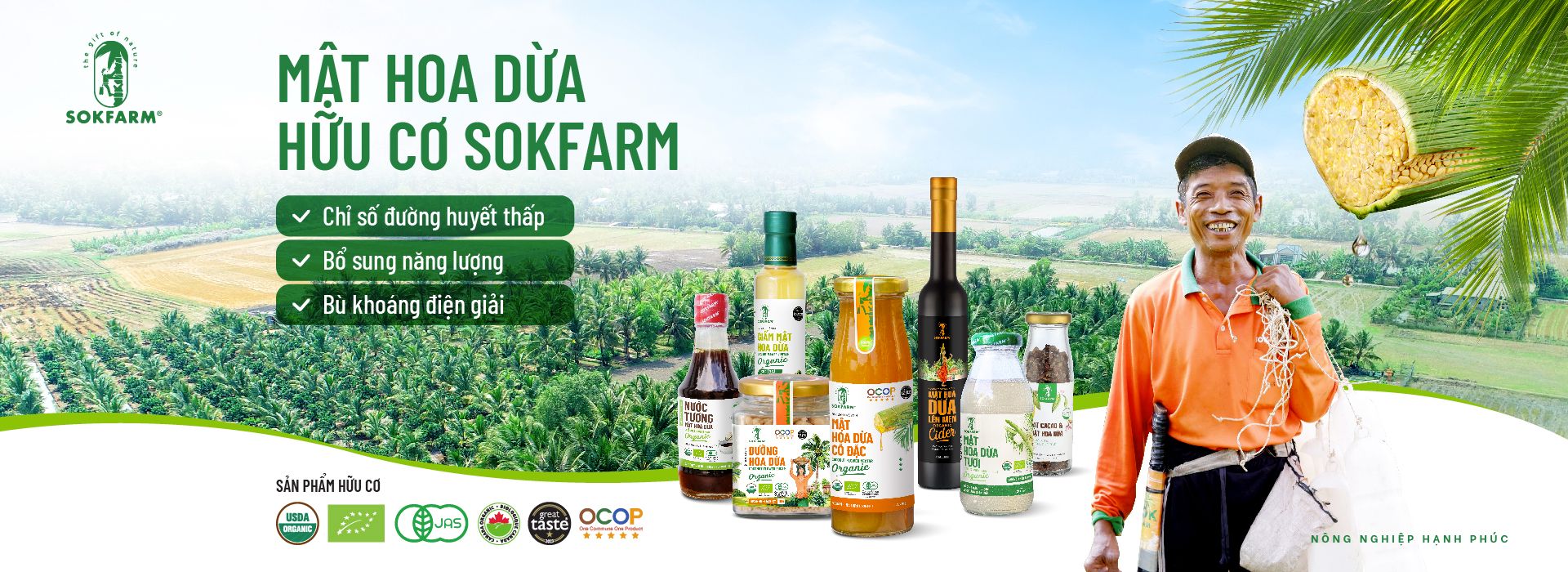

Sokfarm
Sokfarm chọn theo đuổi mô hình kinh doanh tạo ra tác động xã hội, mang lại sinh kế bền vững cho... View more
Proposal
Problem
Saltwater Intrusion
Climate change and rising sea levels are causing saltwater intrusion, a major threat to the Mekong Delta’s agricultural productivity. This phenomenon, where saltwater pushes inland, contaminates freshwater sources and disrupts the delicate balance of the ecosystem. As a result, most crops suffer under these conditions, even salt-tolerant plants like coconut trees are not immune.
Tra Vinh province, a Mekong Delta region bordering the sea with the second-largest coconut plantation area (over 25,000 hectares), exemplifies the struggle. Since 2016, saltwater intrusion has surpassed historical records, leading to a devastating decline in coconut production. This decrease, ranging from 50-60%, has significantly impacted local farmers’ income. The consequences are stark: the price of dried coconuts, once fetching 170,000 VND per 12 fruits, has plummeted to a mere 30,000 VND (VTC News, 2018). This dramatic drop in income highlights the economic hardship caused by this environmental challenge. In essence, saltwater intrusion, a consequence of climate change, is jeopardizing the livelihoods of Mekong Delta farmers who depend heavily on the region’s agricultural bounty, particularly coconut production.
A Fading Khmer Tradition
The traditional art of collecting coconut nectar, a cornerstone of Khmer culture in the Mekong Delta, faces a critical challenge. Particularly in provinces like Tra Vinh, with a significant Khmer population (over 31%) (baotintuc.vn, 2023), young people are increasingly abandoning this time-honored practice. They leave school early and migrate to cities for factory jobs that often offer low wages and poor working conditions.
This exodus has far-reaching consequences. As young people leave, the burden of maintaining the fields falls on the shoulders of an aging population, women and children. This lack of a capable workforce translates to reduced productivity in the Mekong Delta, a region renowned for its rice and fruit production. Neglected fields and orchards lead to a decline in agricultural output, impacting the overall economic health of rural communities.
The situation creates a ripple effect, further exacerbating the economic imbalance between rural and urban areas. While cities struggle to accommodate a sudden influx of unskilled labor, the countryside suffers from a dearth of young, capable workers. This imbalance hinders sustainable development in both regions.
Saltwater intrusion and the fading Khmer tradition of coconut nectar collection pose a dual threat to the Mekong Delta. While saltwater contamination disrupts agricultural productivity and jeopardizes farmer livelihoods, the decline of this cultural practice weakens the Khmer ethnic community’s economic and cultural identity.
However, there’s hope. We can adapt to these challenges by promoting initiatives that are adapting to saltwater intrusion and preserving the traditional Khmer profession.
Solution:
Sokfarm continues to choose coconut trees as a plant known for its ability to withstand saltwater intrusion and climate change, and is one of Vietnam’s 9 key industrial crops. Instead of collecting coconuts, Sokfarm chooses to collect nectar from coconut flowers, which is not affected by the salinity of water or soil, and is also a traditional profession of the southern Khmer people.
Sokfarm prioritizes sustainable development in all its activities, aligning with the United Nations’ Sustainable Development Goals (SDGs).
Climate action and Life on Land
Organic farming – circular production: helps to protect the environment and reduce the impact of climate change. The application of circular production methods helps to optimize the use of natural resources and fertilizers and minimize the amount of chemicals used, thereby reducing the impact on the environment.
Zero Hunger, Decent work and economic growth
25 hectares of organic plantation: A shift to help farmers meet global quality standards: Economic efficiency, soil ecosystem improvement, and regenerative values for nature. Farmers are trained in organic farming methods, enabling them to manage their plantations efficiently and sustainably.
No poverty, Decent work and economic growth
Long-term purchasing policy: Sokfarm has a transparent and long-term purchasing policy for farmers (for 5 years), which helps farmers have a stable source of income and increase economic value by 3-5 times.
Reduced inequalities
Empowering the marginalized in the value chain: Building a fair and respectful work environment that promotes the rights of women and ethnic minorities. 70% of the workforce are women and 80% are Khmer ethnic minorities. Providing comprehensive training and career development opportunities for all employees.
Good health and well-being and Responsible consumption and production:
Health protection products: Sokfarm Organic Coconut Nectar products are a commitment to the mission of serving society and protecting the environment. The product is made from high quality organic ingredients, this ensures that no toxic substances are exposed during the growing, manufacturing and packaging process, thereby protecting the health of consumers. employ workers involved in production. By choosing organic products, customers ensure their own health and contribute to promoting sustainable agriculture and a healthy living environment for the community.
Sokfarm champions a business model aligned with all 17 UN Sustainable Development Goals. This model prioritizes social impact, empowers farmers with sustainable livelihoods, safeguards the environment, integrates vulnerable people into the value chain, and prioritizes community health.
Reference:
- VTC News. (2018, June 17). Giá dừa Bến Tre thấp kỷ lục 2.500 đồng/trái vì Trung Quốc ngưng mua. VTC News. https://vtcnews.vn/gia-dua-ben-tre-thap-ky-luc-2500-dong-trai-vi-trung-quoc-ngung-mua-ar407133.html
- Baotintuc.vn (2023, July 13) Trà Vinh: Phát huy vai trò của người có uy tín vùng đồng bào dân tộc thiểu số. baotintuc.vn. https://baotintuc.vn/dia-phuong/tra-vinh-phat-huy-vai-tro-cua-nguoi-co-uy-tin-vung-dong-bao-dan-toc-thieu-so-20230713114314690.htm


